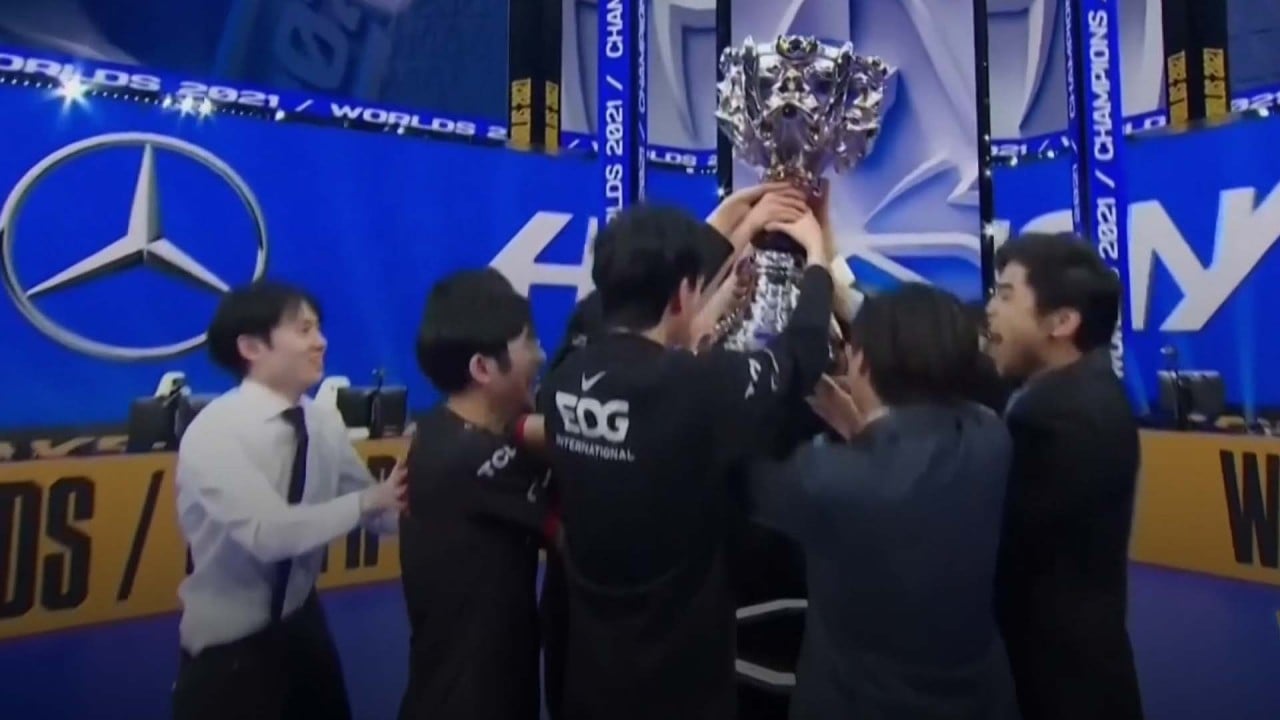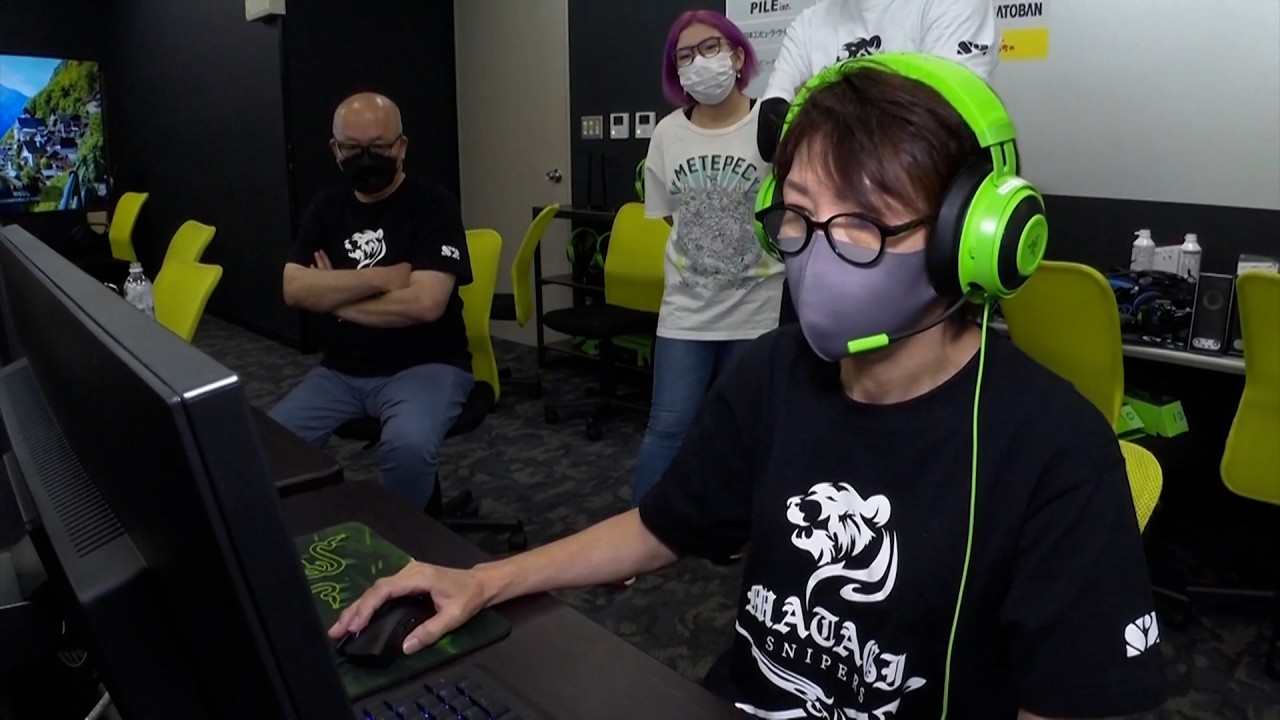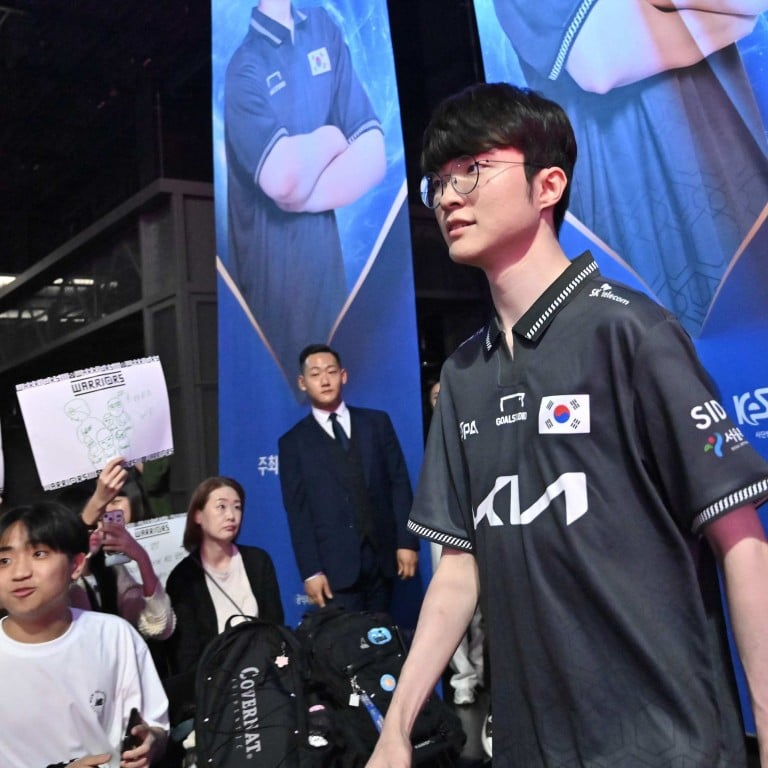
Faker at Asian Games 2023: who is Lee Sang-hyeok and how much is the Lionel Messi of League of Legends worth?
- At the top of his game for more than a decade, he’s been compared to Michael Jordan and Lionel Messi
- A two-time world champion with 10 South Korean titles to his name, Faker is looking to add Asian Games gold to his collection
He was mobbed at the airport when he arrived in Hangzhou for the Asian Games and he has been called the Michael Jordan and Lionel Messi of League of Legends (LoL), but Lee Sang-hyeok is different, because is undoubtedly the best to ever play his game.
Better known as “Faker”, the South Korean mid-laner boasts three World Championships, two Mid-Season Invitationals, 10 national titles, and a highlight reel of the most iconic one-on-ones in the game’s history.
The 19th Asian Games in Hangzhou are the first to host esports competitively and anyone hoping to bring home gold in LoL will have to beat the best there has ever been.
On Monday, Lee’s South Korea beat Hong Kong 1-0 in their first group match and will take on Kazakhstan to see who tops the group and moves to the knockout rounds and a clash with Saudi Arabia on Wednesday.
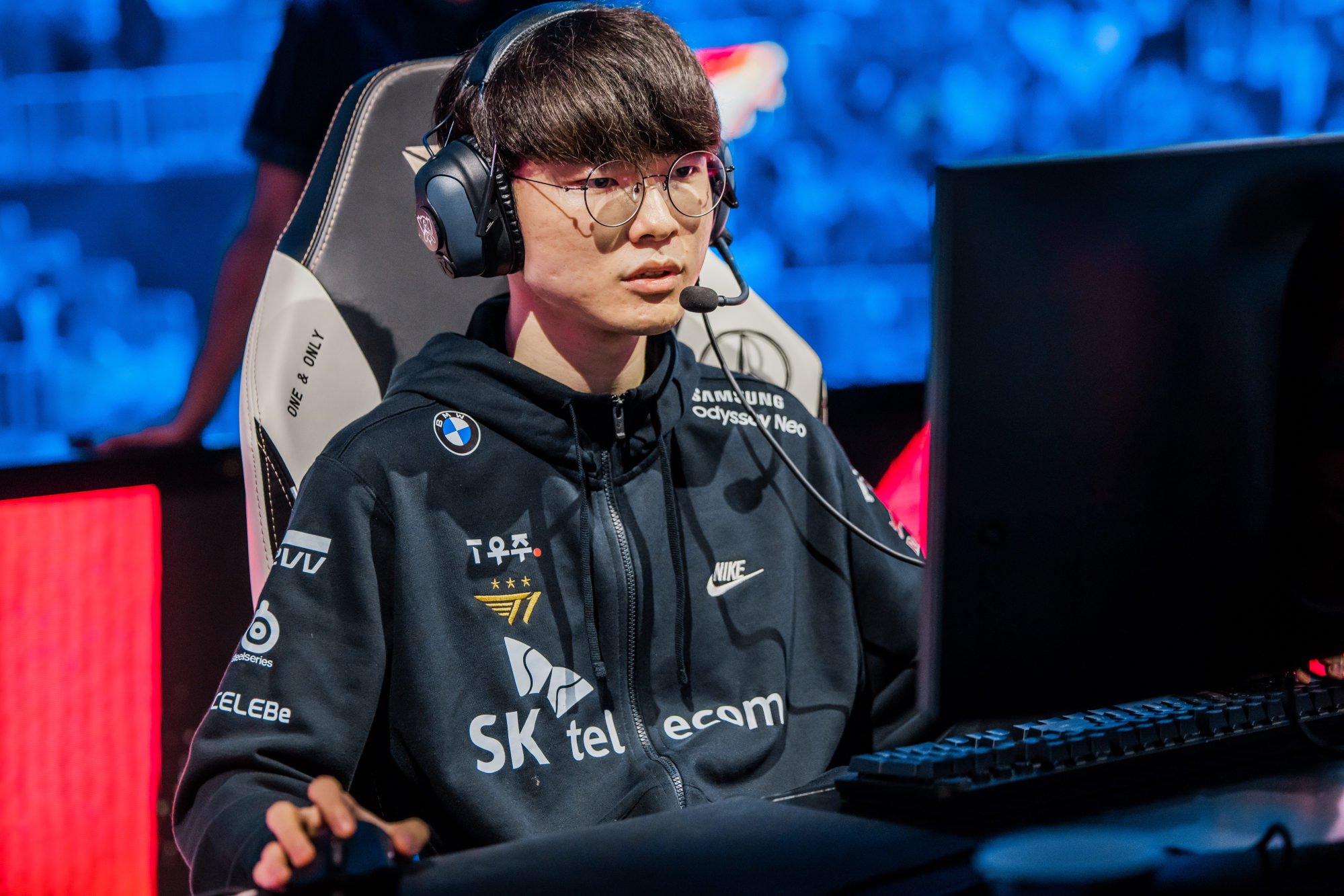
Saudi Arabia, Malaysia, India and China all start in quarter-finals because of their performances in the qualification tournament, which South Korea did not enter.
Lee’s gamer tag is synonymous with mind-blowing plays – just as backyard ballers yell ‘Kobe’ after a tricky jumpshot – and his official nickname is “Unkillable Demon King”.
In 2013, Lee embarked on a professional esports career and leads the SK T1 team, having spent his entire career with the Seoul-based giants. That is more than a decade on top of the world’s most competitive league.
While playing with the team, Lee became the first player to reach 700 games and 2,500 kills in Korea’s top division, LCK (League of Legends Champions Korea).
Here’s what you need to know about the man who became the face of a global franchise that was worth US$1.38 billion in 2022.
Following his passion
Lee Sang-hyeok was born on May 7, 1996, in Seoul and was raised by his single-parent father and grandparents. Lee Kyung-joon, a carpenter, had a laissez faire attitude towards his two sons’ passions.
“They didn’t stop me – they just told me to do what I wanted,” Lee told Korea Now in an interview.
A studious pupil, Lee was an already avid gamer before being introduced to LoL in high school. It did not take long for him to make a name for himself as an amateur, and for then-named SKT T1 K to come calling.
“As a single parent, it’s my role to support my son,” Lee Kyung-joon told ESPN after his son dropped out of Mapo High School.
“He’s doing this because he wants to. I thought … if I don’t let him do what the wants to do, there might be regret. Then I started thinking, ‘wow, he’s really good at this’.”
Originally playing under the handle “GoJeonPa”, Lee was already showing his potential by 2013. The newly branded T1 team won their inaugural world title, before going unbeaten in the winter season of 2014.
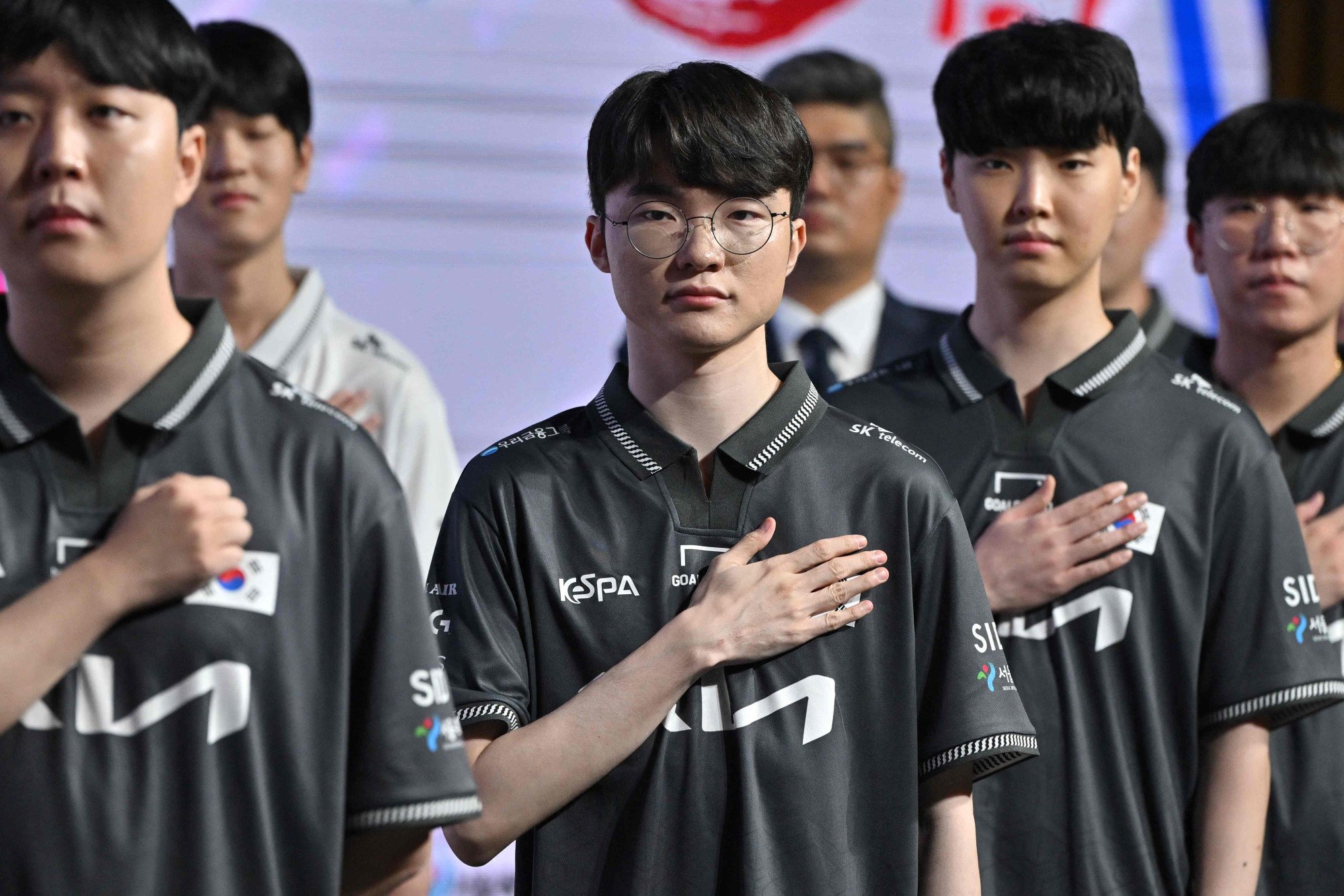
Having failed to qualify for worlds the following season, several Chinese clubs circled with lucrative playing and streaming contracts. It was the prelude to what is now referred to as the 2015 “Korean Exodus”. Lee ultimately declined the offers.
Faker and his team lost just one game on their way to winning their second worlds that season, with his workload shared with Lee Ji-hoon, or “Easyhoon”.
In 2016, a scintillating T1 lifted their first MSI – the only major trophy to evade them at the time – and won back-to-back worlds.
Despite winning their second consecutive MSI, Faker was left in tears at the 2017 worlds after being neutralised by a legendary Samsung Galaxy in the final in Beijing.
“I’ve seen him have a few difficult matches, but it’s the first time I saw him cry,” his father told ESPN.
That the team had cemented themselves as one of the greatest in history was besides the point. Lee had crumbled under the pressure, missing out on a third world consecutive championship amid increased competition.
“Mind control is very important,” he said. “I usually judge myself and try to over come myself, so I make myself a role model and work hard.
“At first, it did feel like a burden [to be called the GOAT], but since I no longer care about how other people see me, I actually feel very proud to have that title.”
Though T1 bowed out of the 2019 worlds semi-finals, a reinvigorated Lee guided them to two more LCK titles and became the first to get 2,000 kills in the league. He was rewarded with a part-ownership of T1 Entertainment and Sports.
The team suffered another semi-final loss at the 2021 worlds in Reykjavik, Iceland in 2021, fuelling more questions over an “ageing” Lee’s future.
He nonetheless re-signed with T1 last November, and is now part of a group that pundits have touted as the sport’s most mechanically gifted team to date.
As Lee’s career entered its 11th year, he achieved another LCK, surpassing Kang “Gorilla” Beom-hyeon to become the player with the most career assists in the history of the league at 4,137.
During the 2023 season, Lee was sidelined for weeks with an arm injury. During his time away, T1’s record fell from 6–2 to 7–9.
Longer lifespans
“I can see why the prejudices around the ‘older players’ exist in this scene, because it has been the case until now,” Lee told Korizon Esports after the team’s 12th consecutive LCK win in 2022.
“Most players’ careers end in their mid- to late- 20s. But I am of the opinion that players currently active in the scene will enjoy longer lifespans. We will continue to see more examples to support this argument in the future.
“A lot of older players, even the players who have not played as long as I, have now retired. The veterans that are left are the ones who can adapt to new meta quickly.
“I would say ‘survival of the fittest’ played a role here. But in the end, I’d say there is no drastic link between a player’s age and performance.”
In fact, Lee had forecast as such in 2018. “I want to keep on until I’m 27, or even older,” he told The Korean Herald. “And I’m confident that I can continue to do so.”
After more than a decade in the game, nobody – not even the dozens of players touted as “the next Fakers” – has even come close.
South Korean esports star Faker could get what BTS couldn’t: military exemption
Champion Ocean
While most elite-level players specialise in a few dozen of the 159 game characters, or “champions”, Lee has a mastery of them all.
In an LCK game in March 2022, Lee broke his own record for most unique picks by a mid-laner with 72. His champions pool is so large that fans refer to it as an “ocean”.
Lee’s adaptability to the continuous updates and patches by the Riot Games developers, and his opponents’ strategic use of the rule allowing each team to ban five opposing champions in the pregame selection, is considered one of his greatest strengths.
“My strength is understanding the flow of the game, when to fight and when not to fight. Regardless of which champion I play, the strength is there,” Lee told ESPN.
Combine with his flawless technical abilities and game knowledge, and you have the Unkillable Demon King. Put him in a team of younger and hungrier players including last season’s LCK MVP, Ryu Min-seok aka “Keria”, and their opponents have a problem on their hands.
Asian Games experiment
The only one major piece of silverware that evades Lee is an official national team title.
He will be hoping that he can add the Asian Games title to his trophy cabinet this year, which could in the future pave the way for a showing at the Olympic Games, although that might not be for a while yet.
To add to the intrigue, there is a high potential of a Korea v China showdown – not at franchise level, but directly under their national flags.
Lee’s Korea were stunned by mainland megastar Jian Zihao, or “Uzi”, and his Team China at the Jakarta 2018 Games final, where esports was included as a demonstration sport. An official gold medal win would earn serious bragging rights.
“At the Asian Games [in 2018], I felt a more diverse demographic of viewers were watching us. We definitely felt more pressure going into the matches,” Lee said after Jakarta.
“But from all the new-found attention, I felt that more and more people were coming to accept and be interested in esports.”
For Lee and his South Korean teammates, there is more than just a gold medal on the line at the Asian Games.
Male athletes from South Korea get their two-year mandatory military service exempted if they win a gold at the Asian Games or the Olympics.
A Call of Duty made in Saudi Arabia? Kingdom pushing video game development
How much is he worth?
“Faker” is as mainstream as it gets. He tops a game played by 180 million monthly active users, with the 2019 world finals netting more than 100 million unique viewers – beating the NFL Super Bowl in 2019.
Lee’s first Twitch live stream peaked at 245,100 – concurrent, not overall views – setting a world record at the time.
As of August 2023, Lee had earned around US$1.47 million in prize money.
Lee’s popularity back home is only magnified. He has starred in adverts with footballing icon Son Heung-min, and has been compared to international K-pop sensations BTS in terms of cultural influence.
There is a documentary comparing Lee’s career with that of Brazilian football legend Ronaldo. “O Fenomeno” even put the winner’s medal around Lee’s neck at the 2017 MSIs.
“Every time I get compared to Sonny and BTS I feel grateful. It’s my honour,” Lee told Naver. “Getting this attention from the world just motivates me to work even harder.”



